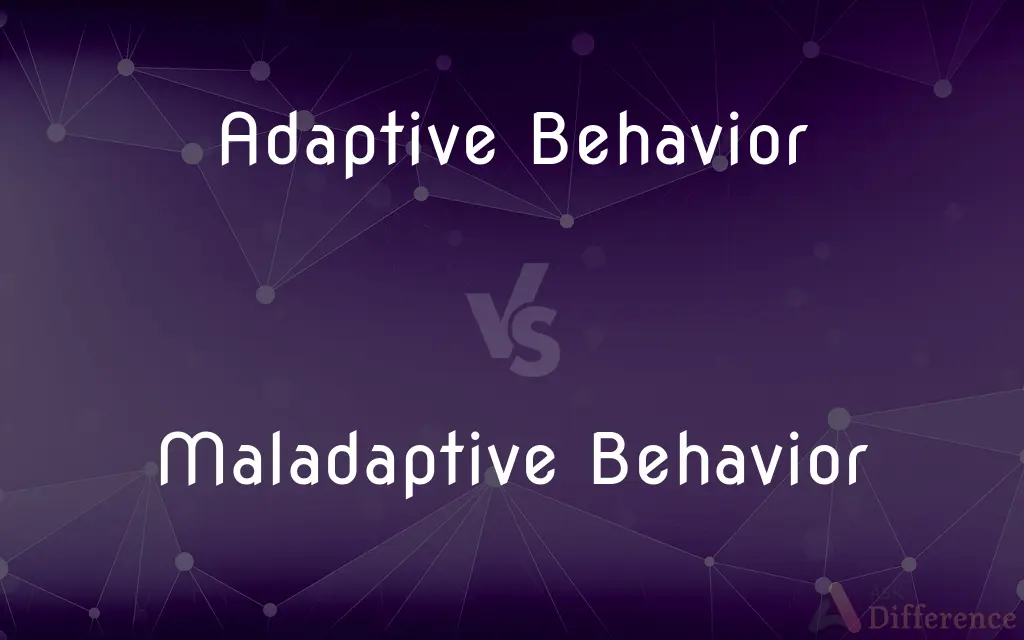Adaptive Behavior vs. Maladaptive Behavior — What's the Difference?
By Tayyaba Rehman & Urooj Arif — Published on February 8, 2024
Adaptive behavior is adjusting positively to circumstances, while maladaptive behavior is harmful, ineffective adjustment.

Difference Between Adaptive Behavior and Maladaptive Behavior
Table of Contents
ADVERTISEMENT
Key Differences
Adaptive behavior refers to actions that effectively adjust to new or challenging situations, promoting well-being and success. In contrast, maladaptive behavior is a response to environmental demands that is counterproductive, often exacerbating problems or failing to achieve desired outcomes.
Adaptive behavior includes skills and responses that enable an individual to cope effectively with demands and challenges, often leading to positive outcomes. Maladaptive behavior, however, involves responses that are ineffective or detrimental, often leading to negative consequences or failure to meet challenges.
In the context of mental health, adaptive behavior is seen as a healthy coping mechanism, aiding in resilience and positive mental health. Maladaptive behavior, on the other hand, can indicate psychological distress or disorders, manifesting as behaviors that hinder personal growth or social functioning.
Adaptive behavior is often characterized by flexibility, problem-solving, and effective emotional regulation. In contrast, maladaptive behavior is typically rigid, dysfunctional in problem-solving, and indicative of poor emotional control.
While adaptive behavior enhances an individual's ability to navigate their environment successfully, maladaptive behavior often results in difficulties in functioning, whether in social, occupational, or other important areas of life.
ADVERTISEMENT
Comparison Chart
Response to Stress
Effective coping mechanisms
Ineffective or harmful coping mechanisms
Impact on Life
Enhances functionality and well-being
Hampers functionality and well-being
Flexibility
Flexible and open to change
Rigid and resistant to change
Problem-solving
Effective and constructive
Ineffective and often destructive
Emotional Regulation
Good emotional control
Poor emotional control
Compare with Definitions
Adaptive Behavior
Effective coping with challenges.
Seeking support from friends during difficult times.
Maladaptive Behavior
Behavior detrimental to personal well-being.
Resorting to substance abuse to escape problems.
Adaptive Behavior
Flexibility in behavior and thought.
Adapting to a new culture while studying abroad.
Maladaptive Behavior
Rigidity in thoughts and actions.
Refusing to consider alternative viewpoints in a debate.
Adaptive Behavior
Positive adjustment to environmental demands.
Learning new skills to excel in a changing job market.
Maladaptive Behavior
Ineffective response to environmental challenges.
Avoiding all social situations due to fear of rejection.
Adaptive Behavior
Constructive problem-solving.
Mediating a conflict to find a mutually beneficial solution.
Maladaptive Behavior
Inadequate emotional regulation.
Reacting with extreme anger to minor annoyances.
Adaptive Behavior
Healthy emotional regulation.
Practicing meditation to manage stress.
Maladaptive Behavior
Poor problem-solving skills.
Escalating an argument instead of seeking resolution.
Common Curiosities
What defines adaptive behavior?
Adaptive behavior is effectively adjusting to changes or challenges in a positive way.
How is maladaptive behavior recognized?
Maladaptive behavior is identified by ineffective or harmful responses to situations.
Can maladaptive behavior be changed?
Yes, through therapy and personal effort, maladaptive behavior can be altered.
Are maladaptive behaviors always negative?
Generally, yes, as they hinder effective functioning and well-being.
Is maladaptive behavior linked to mental illness?
It can be, but not all maladaptive behaviors indicate a mental illness.
Does culture affect adaptive behavior?
Yes, cultural norms and values significantly influence what is considered adaptive.
Is awareness of behavior essential for change?
Awareness is often the first step towards modifying any behavior.
How does stress influence these behaviors?
Stress can trigger both adaptive and maladaptive responses, depending on coping skills.
Are there specific therapies for maladaptive behavior?
Yes, therapies like CBT are effective in addressing maladaptive behaviors.
Is adaptive behavior always conscious?
Not always; it can be both a conscious choice or a natural response.
Can adaptive behavior be learned?
Yes, adaptive behaviors can be developed through experiences and guidance.
Can adaptive behavior become maladaptive?
In certain contexts, previously adaptive behaviors can become maladaptive.
Do children exhibit maladaptive behavior?
Yes, children can display maladaptive behaviors, often due to stress or unmet needs.
Is it possible to have both types of behaviors?
Yes, individuals often exhibit a mix of both adaptive and maladaptive behaviors.
Can societal changes impact these behaviors?
Yes, societal norms and changes can redefine what behaviors are adaptive or maladaptive.
Share Your Discovery

Previous Comparison
Black Walnuts vs. English Walnuts
Next Comparison
Throw in Java vs. Throws in JavaAuthor Spotlight
Written by
Tayyaba RehmanTayyaba Rehman is a distinguished writer, currently serving as a primary contributor to askdifference.com. As a researcher in semantics and etymology, Tayyaba's passion for the complexity of languages and their distinctions has found a perfect home on the platform. Tayyaba delves into the intricacies of language, distinguishing between commonly confused words and phrases, thereby providing clarity for readers worldwide.
Co-written by
Urooj ArifUrooj is a skilled content writer at Ask Difference, known for her exceptional ability to simplify complex topics into engaging and informative content. With a passion for research and a flair for clear, concise writing, she consistently delivers articles that resonate with our diverse audience.
















































